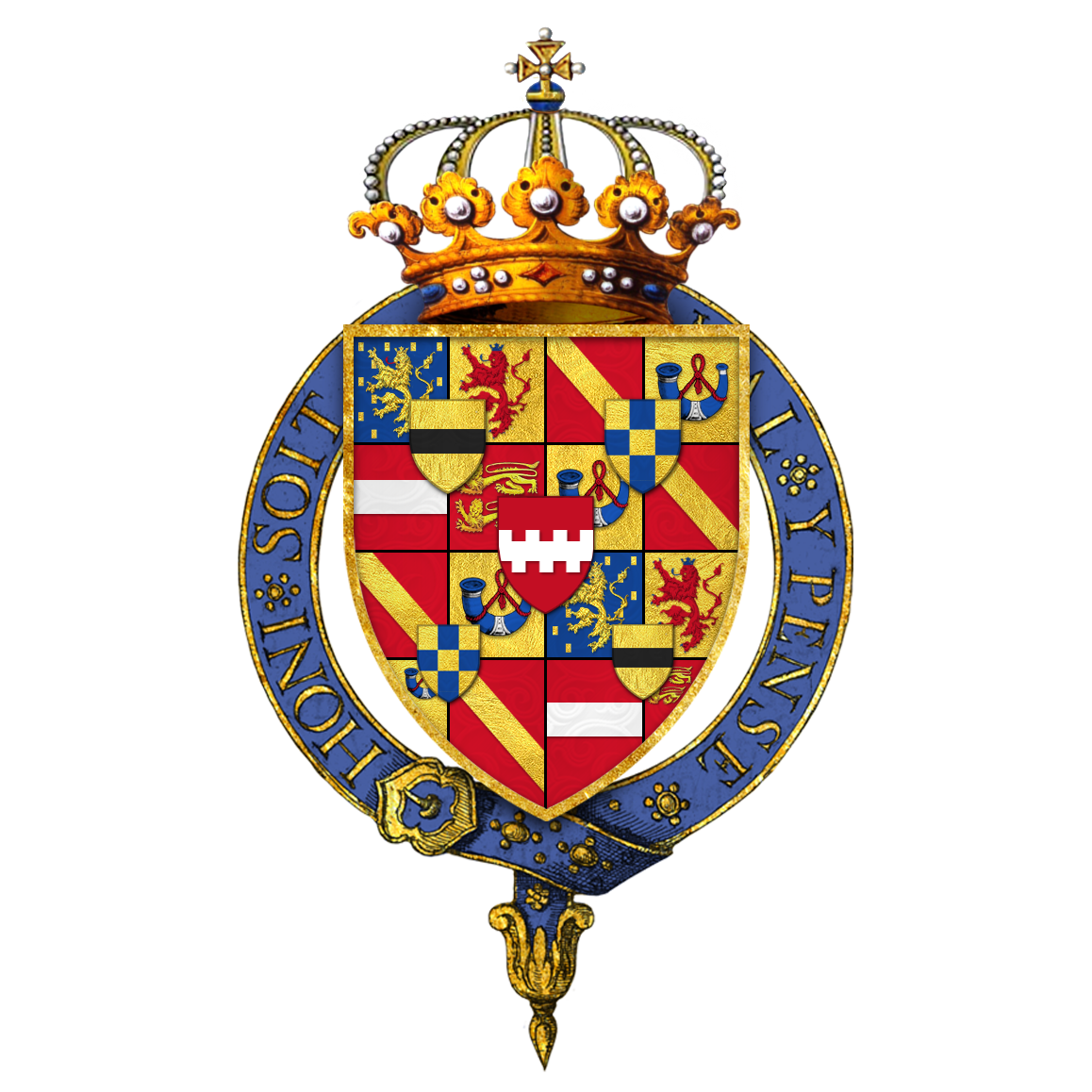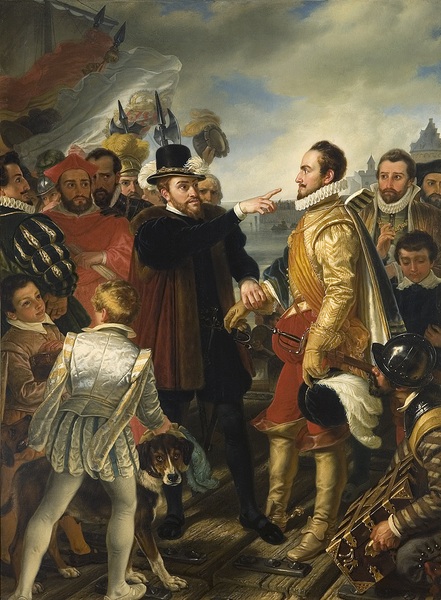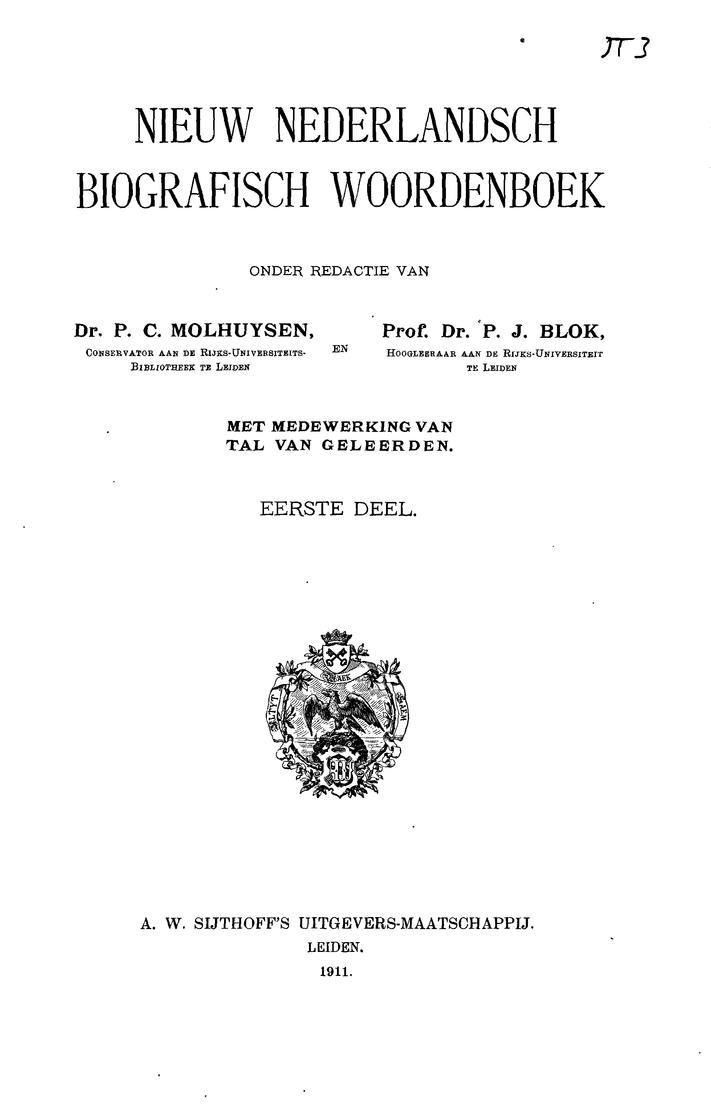|
P. J. Blok
Petrus Johannes Blok (10 January 1855, in Den Helder – 24 October 1929, in Leiden) was a Dutch historian. Biography Born in Den Helder, Blok studied at the Latin School of Alkmaar and read classics at Leiden University, receiving his doctorate for a study of Sextus Pompeius. After this, he got a position at the Leiden Latin School, and published two books on the city's Medieval and Burgundian history. In 1884, he was made professor of Dutch History at the University of Groningen, where he supervised the publication of a series of historical documents from the provinces of Groningen and Drenthe. He was in the habit of traveling much to search for written documents, which brought him as far as Rome: a very long trip back then. Among his students was Pieter Jelles Troelstra. In 1892, Blok was elected a member of the Royal Netherlands Academy of Arts and Sciences. In 1894, he succeeded Robert Fruin as professor of Dutch History in Leiden. Ideas Blok believed that it was the t ... [...More Info...] [...Related Items...] OR: [Wikipedia] [Google] [Baidu] |
Drenthe
Drenthe () is a province of the Netherlands located in the northeastern part of the country. It is bordered by Overijssel to the south, Friesland to the west, Groningen to the north, and the German state of Lower Saxony to the east. As of November 2019, Drenthe had a population of 493,449 and a total area of . Drenthe has been populated for 15,000 years. The region has subsequently been part of the Episcopal principality of Utrecht, Habsburg Netherlands, Dutch Republic, Batavian Republic, Kingdom of Holland and Kingdom of the Netherlands. Drenthe has been an official province since 1796. The capital and seat of the provincial government is Assen. The King's Commissioner of Drenthe is Jetta Klijnsma. The Labour Party (PvdA) is the largest party in the States-Provincial, followed by the People's Party for Freedom and Democracy (VVD) and the Christian Democratic Appeal (CDA). Drenthe is a sparsely populated rural area, unlike many other parts of the Netherlands; except for t ... [...More Info...] [...Related Items...] OR: [Wikipedia] [Google] [Baidu] |
Jan Marijnissen
Johannes Guillaume Christianus Andreas "Jan" Marijnissen () (born 8 October 1952) is a retired Dutch politician of the Socialist Party (SP). Marijnissen, a welder by occupation, was selected as Leader of the Socialist Party after the death of Daan Monjé on 1 October 1986 and became Chairman of the Socialist Party on 20 May 1988. For the election of 1994 Marijnissen was the Lijsttrekker (top candidate) and won two seats in the House of Representatives, the first time the Socialist Party won representation in the States General of the Netherlands. Marijnissen was elected as a Member of the House of Representatives on 17 May 1994 and became the Parliamentary leader of the Socialist Party in the House of Representatives. For the elections of 1998 and 2002 Marijnissen again as Lijsttrekker won three and four seats respectively. For the election of 2006 Marijnissen for the fifth time as Lijsttrekker won sixteen seats and the Socialist Party became the third-largest party in the ... [...More Info...] [...Related Items...] OR: [Wikipedia] [Google] [Baidu] |
Nation Building
Nation-building is constructing or structuring a national identity using the power of the State (polity), state. Nation-building aims at the unification of the people within the state so that it remains politically stable and viable in the long run. According to Harris Mylonas, "Legitimate authority in modern national states is connected to popular rule, to majorities. Nation-building is the process through which these majorities are constructed." Nation builders are those members of a state who take the initiative to develop the national community through government programs, including Conscription, military conscription and national content mass schooling. Nation-building can involve the use of propaganda or major infrastructure development to foster social harmony and economic growth. According to Columbia University sociologist Andreas Wimmer, three factors tend to determine the success of nation-building over the long-run: "the early development of civil-society organisations ... [...More Info...] [...Related Items...] OR: [Wikipedia] [Google] [Baidu] |
Ruth Putnam (author)
Ruth Putnam (18 July 1856, Yonkers, New York – 12 February 1931, Geneva, Switzerland) was an author, suffragist, and alumni trustee of Cornell University. One of eleven children of the publisher George Palmer Putnam and his wife Victorine Haven Putnam, Ruth Putnam received her bachelor's degree in 1878 from Cornell University. (In 1873 Emma Sheffield Eastman was the first woman to graduate from Cornell University.) Ruth Putnam wrote a number of historical works and consulted original sources in Dutch, French, and German, as well as English. She also wrote a biography of her eldest sibling Mary Corinna Putnam Jacobi, who was a famous physician and suffragist. Selected publications * as collaborator with Alfred John Church: (historical novel) * (translated into Dutch ade Zwijger, Prins van Oranje''(1900) by Dirk Christiaan Nijhoff) * *as editor with Eva Palmer Brownell, Maud Wilder Goodwin, and Alice Carrington Royce: *as translator with Oscar Albert Bierstadt: ; a translation a ... [...More Info...] [...Related Items...] OR: [Wikipedia] [Google] [Baidu] |
Histoire De Belgique (book)
''Histoire de Belgique'' ( French; ) is a seven-volume survey of the Belgian history by the historian Henri Pirenne (1862–1935) written in French and published between 1900 and 1932. The series, which traces the emergence of the Belgian nation-state from the Roman era until the start of World War I, is a classic of nationalist historiography and one of Pirenne's major works. Although Pirenne is today best known as a historian of Medieval Europe, the ''Histoire de Belgique'' series was his most respected work during his lifetime and the foundation of his reputation as Belgium's leading public historian. Argument and reception Unlike much nationalist historiography, Pirenne's history did not trace the emergence of a "Volksgeist" (national spirit) but argued that Belgium had developed naturally as a cosmopolitan society to serve as a mediator between Latin and Germanic Europe. Pirenne did, however, believe in the existence of a distinctly "Belgian civilisation" (''civilisation bel ... [...More Info...] [...Related Items...] OR: [Wikipedia] [Google] [Baidu] |
Henri Pirenne
Henri Pirenne (; 23 December 1862 – 24 October 1935) was a Belgian historian. A medievalist of Walloon descent, he wrote a multivolume history of Belgium in French and became a prominent public intellectual. Pirenne made a lasting contribution to the study of cities that was a controversial interpretation of the end of Roman civilization and the rebirth of medieval urban culture. He also became prominent in the nonviolent resistance to the Germans who occupied Belgium in World War I. Henri Pirenne's reputation today rests on three contributions to European history: for what has become known as the Pirenne Thesis, concerning origins of the Middle Ages in reactive state formation and shifts in trade; for a distinctive view of Belgium's medieval history; and for his model of the development of the medieval city. Pirenne argued that profound social, economic, cultural, and religious movements in the long term resulted from equally profound underlying causes, and this attitude ... [...More Info...] [...Related Items...] OR: [Wikipedia] [Google] [Baidu] |
Michiel De Ruyter
Michiel Adriaenszoon de Ruyter (; 24 March 1607 – 29 April 1676) was a Dutch admiral. Widely celebrated and regarded as one of the most skilled admirals in history, De Ruyter is arguably most famous for his achievements with the Dutch Navy during the Anglo-Dutch Wars. He fought the English and French forces and scored several critical victories, with the Raid on the Medway being the most famous among them. Often dubbed a Dutch folk hero, De Ruyter is one of a few select officers in the history of the Dutch navy to hold the title of the lieutenant admiral ( nl, luitenant-admiraal). Reportedly beloved by his subordinates and seamen, De Ruyter was commonly nicknamed ''Bestevaêr'' (Middle Dutch for "grandfather") during his service, a nickname that is sometimes still used to refer to him in Dutch media. Early life De Ruyter was born on 24 March 1607 in Vlissingen, in the Spanish Netherlands, the son of a seaman who eventually became a brewery drayman, Adriaen Michielszoo ... [...More Info...] [...Related Items...] OR: [Wikipedia] [Google] [Baidu] |
Frederik Hendrik
Frederick Henry ( nl, Frederik Hendrik; 29 January 1584 – 14 March 1647) was the sovereign prince of Orange and stadtholder of County of Holland, Holland, County of Zeeland, Zeeland, Lordship of Utrecht, Utrecht, Guelders, Lordship of Overijssel, Overijssel in the Dutch Republic from 1625 until his death in 1647. In the last seven years of his life, he was also the stadtholder of Groningen (province), Groningen (1640-1647). As the leading soldier in the Dutch wars against Spain, his main achievement was the successful Siege of 's-Hertogenbosch in 1629. It was the main Spanish base and a well-fortified city protected by an experienced Spanish garrison and by formidable water defenses. His strategy was the successful neutralization of the threat of inundation of the area around 's-Hertogenbosch' and his capture of the Spanish storehouse at Wesel. Biography Early life Frederick Henry was born on 29 January 1584 in Delft, Holland, Dutch Republic. He was the youngest child of Wil ... [...More Info...] [...Related Items...] OR: [Wikipedia] [Google] [Baidu] |
William The Silent
William the Silent (24 April 153310 July 1584), also known as William the Taciturn (translated from nl, Willem de Zwijger), or, more commonly in the Netherlands, William of Orange ( nl, Willem van Oranje), was the main leader of the Dutch Revolt against the Spanish Habsburgs that set off the Eighty Years' War (1568–1648) and resulted in the formal independence of the United Provinces in 1648. Born into the House of Nassau, he became Prince of Orange in 1544 and is thereby the founder of the Orange-Nassau branch and the ancestor of the monarchy of the Netherlands. In the Netherlands, he is also known as Father of the Fatherland (''Pater Patriae'') ( nl, Vader des Vaderlands). A wealthy nobleman, William originally served the Habsburgs as a member of the court of Margaret of Parma, governor of the Spanish Netherlands. Unhappy with the centralisation of political power away from the local estates and with the Spanish persecution of Dutch Protestants, William joined the D ... [...More Info...] [...Related Items...] OR: [Wikipedia] [Google] [Baidu] |
Nieuw Nederlandsch Biografisch Woordenboek
The ''Nieuw Nederlandsch Biografisch Woordenboek'' (''NNBW'') is a biographical reference work in the Dutch language. It has been succeeded by the ''Biografisch Woordenboek van Nederland''. It was published in ten parts between 1911 and 1937 by Sijthoff, Leiden, and the editors were and P. J. Blok. The lexicon contains more than 22,000 short biographies on important or at least notable Dutch people. No persons born after 1910 were included. The ''NNBW'' was compiled by several hundred historians and other experts. Since then it has been considered one of the most important reference works for Dutch history. It has been digitalised through a collaboration between the Digital Library for Dutch Literature (dbnl) and the Institution for Dutch History (ING), and both organisations have made the ''NNBW'' fully available to everyone on their respective sites. External links * Nieuw Nederlandsch Biografisch Woordenboek' at the Huygens Institute * Nieuw Nederlandsch biografisch woorde ... [...More Info...] [...Related Items...] OR: [Wikipedia] [Google] [Baidu] |
Robert Fruin
Robert Jacobus Fruin (11 November 1823 in Rotterdam – 29 January 1899 in Leiden) was a Dutch historian. A follower of Leopold von Ranke, he introduced the scientific study of history in the Netherlands when he was professor of Dutch national history ( nl, Vaderlandsche Geschiedenis) at Leiden University. Biography Fruin, a lifelong bachelor, studied classical philology at Leiden University from 1842, and received his Ph.D. on 18 December 1847 with a dissertation on Manetho, entitled ''De Manethone Sebennytha''. As he was a man of independent means, he spent the next two years in independent studies and political pursuits in Utrecht, before he accepted a position as praeceptor (teacher) in history at Leiden Gymnasium in 1850. These were tumultuous times in Dutch constitutional history as the liberal 1848 Dutch constitutional reform by Johan Rudolf Thorbecke had just been completed, and was the subject of heated political debate. In this debate Fruin took the liberal side and ... [...More Info...] [...Related Items...] OR: [Wikipedia] [Google] [Baidu] |





